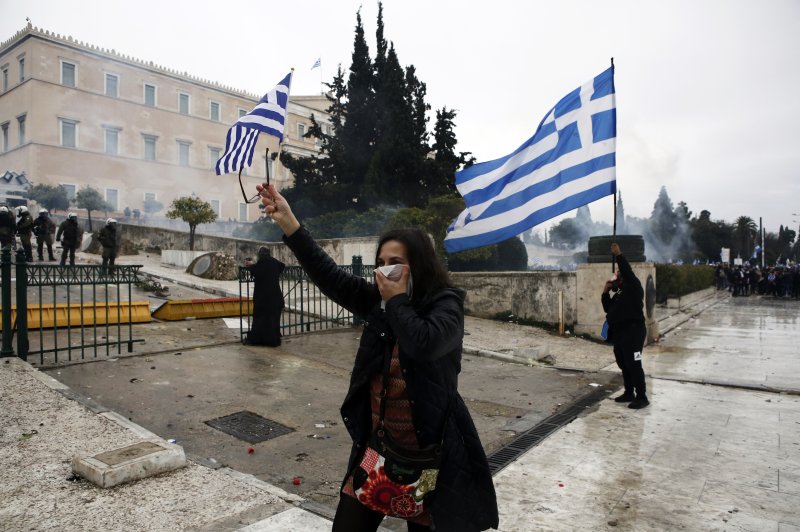A protester tries to shield herself from tear gas thrown by police on Sunday during clashes over an agreement to change the name of a former Yugoslav territory to The Republic of North Macedonia. Photo by Yannis Koledsdis/EPA-EFE
Jan. 24 (UPI) -- Lawmakers in Greece will vote soon on a deal between the Greek government and the Former Yugoslav Republic of Macedonia to change the latter's name, resolving a dispute nearly three decades old.
The issue of changing the republic's name has been debated for 27 years, since it broke away after Yugoslavia's fall in 1991. Last summer, both sides came to an agreement to change the country's name in exchange for admission to NATO and the European Union.
If the accord is approve, the former Yugoslav territory will become the Republic of North Macedonia. The region in north Greece is known only as Macedonia.
The deal is expected to be approved, but there's opposition across Greece's political spectrum. They want to protect the "Greekness" of the region of Macedonia and not let an adjoining country lay claim to the name.
Experts believe the vote will be close. To pass, Prime Minister Alex Tsipras needs some lawmakers to break from party lines.
The vote was set for Thursday, but was postponed to Friday, Al Jazeera reported.
Polls show two-thirds of Greek voters disapprove of the name change.
New Democracy leader Kyriakos Mitsotakis called on lawmakers to denounce the "bad" agreement and accused leadership of surrendering "Macedonian identity and language."
In the past, Greece has thwarted the republic's attempts to join NATO and the European Union. As part of the deal, the former Yugoslav republic must agree it has no ambitions for the Greek region.
The Greek Communist Party has hung banners opposing the name change on the Acropolis, where the famous Parthenon sits. It says, "No: to the plans of USA-NATO-EU" and "No to irredentism and nationalism." It adds, "Yes to friendship-solidarity and joint struggle of the people."
Much of the Greek pride has to do with the heritage of Alexander the Great, who was from Macedonia. Some were angered when FYROM put Alexander the Great's name on the airport in Skopje and a highway. Both names have since been dropped.















